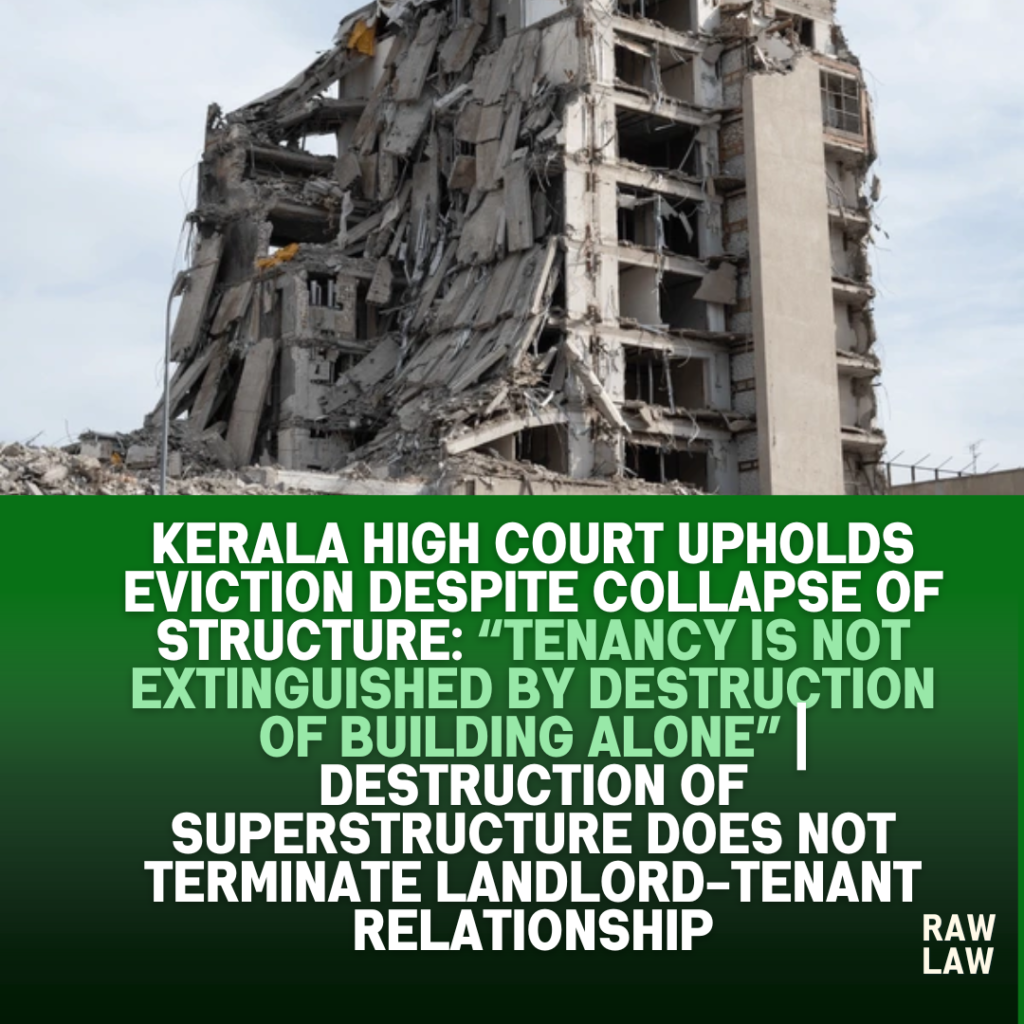Court’s Decision
In R.C. Rev. No. 123 of 2025, the Kerala High Court dismissed the tenant’s revision petition challenging concurrent eviction orders passed under Sections 11(2)(b) and 11(3) of the Kerala Buildings (Lease and Rent Control) Act, 1965. The Division Bench of Justices A. Muhamed Mustaque and Johnson John held that the collapse of the petition schedule building did not extinguish the tenancy as long as the land continued to be occupied. The Court reaffirmed that once the denial of title and landlord-tenant relationship has been found to be not bona fide and confirmed in prior litigation, it cannot be reopened.
Facts
The eviction petition was filed on the grounds of arrears of rent and bona fide residential requirement. The original petitioners were the legal heirs of Abdul Majeed, who inherited the property from his sister. The tenant resisted the petition on multiple grounds, including lack of landlord-tenant relationship due to destruction of the building by heavy monsoon in 2011, and the absence of a valid notice demanding rent.
Earlier, in O.S. No. 594 of 2008, a civil court had already held that there was a landlord-tenant relationship. In subsequent Rent Control proceedings, denial of title was rejected as not bona fide. Those findings were confirmed by the Appellate Authority and the High Court in R.C. Rev. No. 83 of 2020.
Issues
- Whether the landlord-tenant relationship continued to exist after the destruction of the building?
- Whether the eviction was sustainable under Sections 11(2)(b) and 11(3) of the Kerala Rent Control Act?
Petitioner’s Arguments
The petitioner contended that there was no landlord-tenant relationship as the rented structure had crumbled during heavy rains in 2011. She asserted that she was living on a different part of the property, and denied having received any notice demanding rent. It was also argued that the alleged need was not bona fide, and that she was entitled to the protection under the first proviso to Section 11(3) of the Act.
Reliance was placed on:
- Sidharthan v. Ramadasan [1984 KHC 162]
- Vannattankandy Ibrayi v. Kunhabdulla Hajee [(2001) 1 SCC 564] – which held that if a structure under lease is destroyed by a natural calamity, the tenancy stands extinguished.
Respondent’s Arguments
The respondents highlighted that denial of title had already been rejected as not bona fide in earlier proceedings, and confirmed in R.C. Rev. No. 83 of 2020. It was argued that once this finding has attained finality, the tenant could not reagitate it.
It was further submitted that a valid demand notice was issued and received. The landlords’ need for residential premises was bona fide, especially since the petitioners were widows with no permanent residence.
They relied on:
- T. Lakshmipathi v. P. Nithyananda Reddy [(2003) 5 SCC 150]
- Shaha Ratansi Khimji & Sons v. Kumbhar Sons Hotel (P) Ltd. [(2014) 14 SCC 1] – to argue that even if the superstructure is destroyed, the lease over the land continues, and tenancy does not automatically end.
Analysis of the Law
The Court emphasized that under the Kerala Buildings (Lease and Rent Control) Act, once denial of title is found to be not bona fide and affirmed through a final judicial verdict, it cannot be reopened in revision. The Court also reaffirmed that the destruction of the building alone does not nullify a tenancy, as tenancy includes interest in land and structure.
The decisions in T. Lakshmipathi and Shaha Ratansi Khimji were followed to reject the tenant’s reliance on Vannattankandy Ibrayi, which was overruled by a larger bench. The Court explained that tenancy involves a composite interest in land and building, and unless the land itself becomes uninhabitable or unavailable, the lease remains enforceable.
Precedent Analysis
- Overruled Precedent: Vannattankandy Ibrayi [(2001) 1 SCC 564] was overruled by the larger bench in Shaha Ratansi Khimji & Sons [(2014) 14 SCC 1], which clarified that tenancy over land does not get extinguished by destruction of the building alone.
- Binding Precedent: The Court followed Hindustan Petroleum Corpn. Ltd. v. Dilbahar Singh [(2014) 9 SCC 78] to hold that revisional jurisdiction under Section 20 of the Act does not permit reappreciation of evidence unless findings are perverse or illegal.
Court’s Reasoning
The Court noted that:
- The finding of a landlord-tenant relationship had attained finality.
- The tenant continued to reside on the same property.
- The demand notice for arrears of rent was duly served and acknowledged.
- The landlords’ need was supported by evidence and found to be bona fide.
- There was no evidence to show that the landlords had alternative premises.
As such, the Court held that the eviction orders under Sections 11(2)(b) and 11(3) were lawful and did not warrant interference.
Conclusion
The revision petition was dismissed. The concurrent orders of eviction passed by the Rent Control Court and the Appellate Authority were upheld in full.
Implications
This decision reinforces the principle that tenancy includes rights in land and not merely the superstructure. Even in the event of a building’s collapse, the tenant cannot deny the relationship or resist eviction unless statutorily protected. The judgment also limits the revisional powers of the High Court under Section 20 of the Act and affirms the sanctity of findings confirmed through previous litigation.
Summary of Referred Judgments
- Sidharthan v. Ramadasan (1984 KHC 162): Cited to argue tenancy ends with building collapse.
- Vannattankandy Ibrayi v. Kunhabdulla Hajee (2001) 1 SCC 564: Held that tenancy ends if subject matter (building) is destroyed. Overruled.
- T. Lakshmipathi v. P. Nithyananda Reddy (2003) 5 SCC 150): Clarified lease includes land and not just the building.
- Shaha Ratansi Khimji & Sons v. Kumbhar Sons Hotel (P) Ltd. (2014) 14 SCC 1: Overruled Ibrayi, held that lease survives destruction of the building.
- Hindustan Petroleum Corp. Ltd. v. Dilbahar Singh (2014) 9 SCC 78: Clarified limits of revisional jurisdiction under Section 20.



